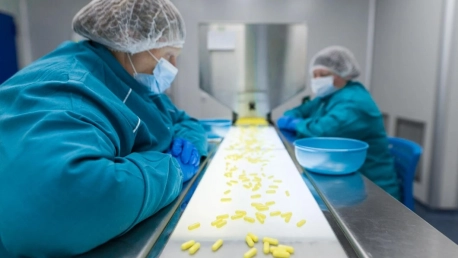The biopharmaceutical industry is undergoing a radical transformation as digital tools, particularly artificial intelligence (AI) and machine learning (ML), are increasingly deployed to tackle the daunting challenge of reducing drug manufacturing costs. These technologies are not just incremental improvements but are central to a paradigm shift that is streamlining the entire spectrum of drug discovery, development, and clinical manufacturing.
Embracing AI in Pharma Manufacturing
The Digital Transformation
The pharma industry’s digital transformation is poised to mitigate the soaring costs that have long been a bottleneck. By harnessing the power of AI and ML, pharma companies are pushing the boundaries of what’s possible, turning large datasets into actionable insights, and optimizing every stage of the drug manufacturing process. These tools enable more efficient use of resources, the minimization of waste, and the acceleration of time-to-market for new medications, thereby driving down costs significantly.
Enhancing Drug Discovery and Development
AI is dramatically changing the landscape of drug discovery by providing tools to analyze biological data and predict outcomes more quickly than ever before. It’s leading to the identification of promising drug targets at record speed, significantly condensing the time required for this pivotal phase of drug development. Meanwhile, ML algorithms are being used to sift through vast arrays of chemical compounds to predict which are most likely to result in effective and safe medications, fine-tuning development strategies in ways previously unimaginable.
Streamlining Manufacturing Processes
In the realm of manufacturing, digital twins exemplify innovation. They create virtual replicas of physical production systems, allowing for exhaustive experimentation and optimization without the risk and cost of interrupting actual production. This means processes can be finely tuned for maximum efficiency before being rolled out in the real world, thus saving time and resources. Such virtualization paves the way for unprecedented levels of precision and control within the manufacturing environment.
Integrating Supply Chain Management
Efficiency in supply chain management is critical for cost containment, and here too, AI and ML are making their mark. AI systems can predict and respond to supply and demand fluctuations, optimizing inventory levels and delivery schedules. This helps prevent both shortages and surpluses, reducing the costly consequences of mismatched supply chain dynamics. Through intelligent forecasting and adaptive logistics, these technologies are crucial for ensuring a lean and cost-effective supply chain.
Addressing the Cost Challenge
Complexity of Novel Drug Modalities
The surge in the complexity of novel drug modalities translates directly to increased manufacturing costs. New therapeutic entities like CAR-T therapies and oligonucleotides present unique production challenges that are currently resolved through high-cost processes. However, sustained investment in technology, particularly AI and ML, is anticipated to drive down these costs over time as processes mature and become more efficient.
Cost-Mitigation Through AI Integration
Integrating AI into the manufacturing of complex drugs, such as CAR-T treatments, can lead to tremendous cost savings. AI-enabled process optimization can streamline every phase of manufacturing, from cell programming to expansion and infusion. This not only reduces resource expenditure but can significantly enhance the scalability of personalized treatments, eventually curbing the overall cost of these life-saving therapies.
Precision Medicine and Clinical Development
AI’s role in precision medicine is a game-changer for clinical development. Personalized treatment plans that are tailored to the individual’s genetic makeup can be optimized using AI-driven predictions of drug metabolism and response. This precision reduces trial-and-error in clinical phases, accelerates development timelines, and diminishes the resource drain often associated with bringing new drugs to market.
Looking Ahead: The Pharma Industry’s Digital Future
The Relationship Between Digital Tools and Regulatory Compliance
Managing regulatory compliance is a substantial challenge for the pharma industry, particularly across diverse global markets. Digital tools, underpinned by AI and ML algorithms, lend crucial support by ensuring processes adhere to stringent regulatory standards. These technologies can monitor and maintain quality control, automatically detecting deviations and facilitating swift corrective actions, thereby safeguarding compliance.
Innovation, Efficiency, and Patient-Centricity
Innovation and efficiency are the twin pillars of the pharma industry’s odyssey towards patient-centricity. AI and ML don’t just drive cost savings; they enable the creation of treatments that are centered around patients’ unique needs and conditions. This focus ensures that the industry moves towards providing therapies that are not only effective but are also accessible and tailored to individual patients.
Envisioning the Impact of Digitalization on Pharma Manufacturing
The fusion of AI and biopharma has the potential to rewrite the future of drug manufacturing. With digitalization at its core, the pharma industry can expect to see a radical uplift in its capability to produce treatments swiftly, efficiently, and cost-effectively. This transition promises a new era of manufacturing where the symbiosis of technology and biology culminates in a landscape ripe for innovation, rich in quality, and unwavering in its commitment to patient care.









